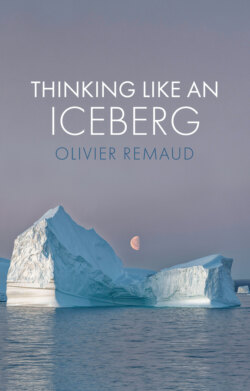Читать книгу Thinking Like an Iceberg - Olivier Remaud - Страница 8
Prologue They are Coming!
ОглавлениеThe morning was dark. Fog was suspended over our heads. Pancakes of ice floated near the ice edge. The sea seemed sluggish.
Then a discreet sun lit up the horizon.
Three points appeared in the distance. A thin silhouette emerged from the fog. I could not immediately identify the shape, but it was becoming more and more curved. No whale has these spurs on its back; my nomadic brothers are larger.
The clouds began to glow.
A ship was approaching us.
It was making slow progress. Like a lost penguin, it took small steps sideways. When it anchored in our vicinity, I saw them stirring. They were huddled together on the forecastle, jumping up and down in a strange dance. They were pointing at me. Their faces were long, their beards shaggy, and they smelt strong. They looked like ghosts. I could only make out the males. Some smiled, others opened their mouths but no words came out. With their hands on the main mast, some were kneeling and bowing their heads. They crossed themselves as they stood up.
A man emerged from a cabin at the back of the ship. He climbed the stairs leading to the deck. A group followed him. Drumbeats echoed in the silence of the ocean. When the music stopped, he was announced by one of his companions.
Captain James Cook looked at the assembled crew and then addressed his sailors. His clear voice carried a long way. He told them that they had sailed far and wide, so far across the ocean at this latitude that they could no longer expect to see any more dry land, except near the pole, a place inaccessible by sea. They had reached their goal and would not advance an inch further south. They would turn back to the north. No regrets or sadness. He prided himself on having fulfilled his mission of completing his quest for an Antarctic continent. He seemed relieved.
As soon as the captain’s speech was over, a midshipman rushed to the bow. He climbed over the halyards and managed to pull himself up onto the bowsprit. There, balancing himself, he twirled his hat and shouted, ‘Ne plus ultra!’ Cook called the young Vancouver back to order, urging him not to take pride in being the first to reach the end of the world. Screaming thus in Latin that they would go ‘no further!’ made him unsteady over the dark waters. He could fall into oblivion with the slightest gust of wind. The crew burst out laughing. With a smile on his face, the reckless hopeful returned to the bridge like a good boy. Then they turned their backs on me and went back to their tasks, some disappearing into the bowels of the ship while others climbed up to the sails.
Those three words echoed in the sky. I remember it with pride.
Call me ‘The Impassable’.
I am the one who stopped Cook on his second voyage around the world, the happy surprise that cut short his labours at 71° 10’ latitude south and 106° 54’ longitude west.
I am one of the icebergs on which the Resolution, a three-masted ship of four hundred and sixty-two tons, would have crashed if the fog had not cleared. On that day, 30 January 1774, they saw me in all my imposing, menacing volume.
My comrades from Greenland are slender. I am flat and massive. I blocked the way without giving them the chance of going around me. In any case, there is only ice behind me, an infinity in which they would have become lost. I saved them from a fatal destiny.
Thanks to me, an entire era thought that no one before the captain had gone so far south, that he was the sole person, the only one, the incredible one to have achieved this feat. What can I say about the snow petrels that have been landing on my ridges for centuries? I am familiar with these small white birds with black beaks and legs. They are attracted by the tiny algae that cling to my submerged sides.
Cook and his sailors kept their distance. Except for the times when they took picks and boarded fragments of iceberg from longboats. They climbed over them, dug them up and extracted blocks of ice which they left in the sun on the deck of the big ship to melt so they could drink their water.
We were much more than their tired eyes could count, not ninety-seven but thousands, an ice field as far as the eye could see.
We were a whole population.
